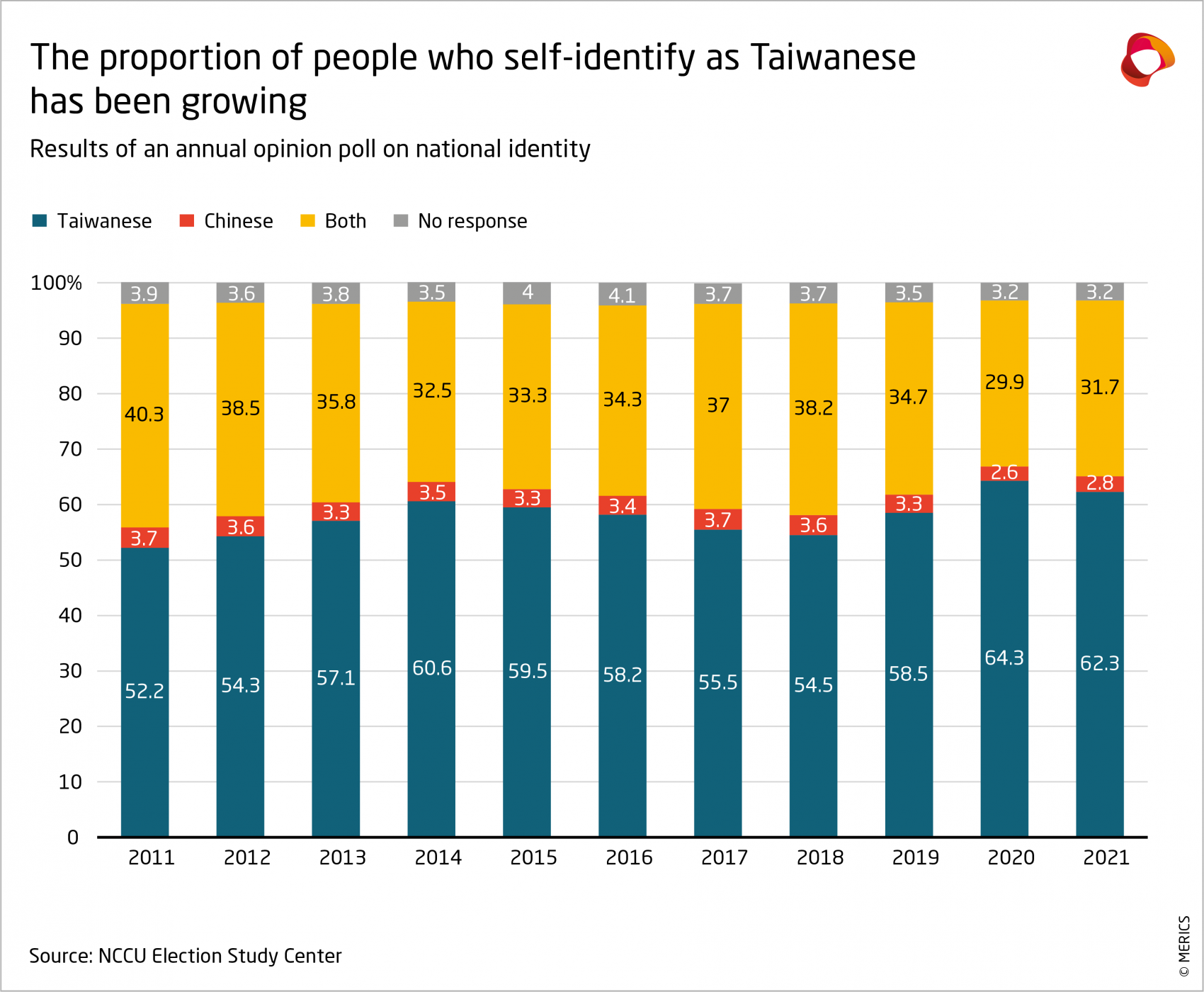

Why cross-strait relations and national identity matter more than ever in Taiwan politics
Putin’s invasion of Ukraine has inadvertently put Taiwan in the spotlight. The political plights of the two countries are similar – both have powerful and authoritarian neighbors who, for many years, have made claims on their territories. But there are also significant differences, and Taiwan is not Ukraine 2.0. Nevertheless, Taiwanese are watching events in Ukraine closely and remain on high alert. By Valarie Tan and Yu-Fen Lai.
The concert and speed with which the United States, Europe and other like-minded partners agreed to impose sanctions on Russia to cripple its economy, and the widespread global condemnation of Putin’s actions in Ukraine, provide a likely scenario and – hopefully – a deterrent for China, should it think of taking over Taiwan by force any time in the near future. Nevertheless, the pressure on Taiwan remains, and the island continues to be on high alert. President Xi Jinping may have officially described the situation in Ukraine as a war, but he notably refrained from calling it an invasion and resisted from condemning Putin’s actions. Fears therefore continue to loom large in Taiwan.
Preparing for the worst
While President Tsai Ing-wen has stressed that Taiwan’s situation differs fundamentally from Ukraine’s, and has warned against rumor-mongering of an impending war, she has nevertheless ordered the military to step up vigilance and readiness to bolster national security. The Defense Ministry has announced plans to double missile production, while Taiwanese security experts are closely studying Russia’s war tactics and Ukraine’s resistance for lessons and strategies to adopt in case China invades. For added defense, a proposal is now being drafted to extend compulsory military service beyond the current four months. Apart from an outpouring of donations and humanitarian aid to Ukraine, many Taiwanese are signing up for self-defense and first aid courses to be ready should the worst hit.
But citizens in Taiwan are not just waking up to this reality now. The fear of an invasion has loomed large on the minds of the Taiwanese for the past three years, as China has continuously ratchetted up economic, diplomatic and military pressure in cross-strait relations. Just last year, Chinese warplanes made 969 incursions into Taiwan’s air defense space – more than twice the 380 encroachments documented in 2020. In an unprecedented move, Beijing sanctioned three high-ranking Taiwanese politicians last November for “fanning hostility” and using “malicious actions to seek independence”. The grim security outlook in Taiwan even has a nickname: “dried mangoes” (芒果干), a popular Taiwanese snack, when said aloud in Chinese, is phonetically identical to “national existential crisis” (亡国感).
Support for self-governance is growing
Against the backdrop of preparations for the worst case, resistance in Taiwan towards China’s push for reunification has also been on the rise. While most Taiwanese are generally in favor of warmer economic relations with Beijing, they are less supportive when it comes to forging stronger political ties. In fact, a sizable proportion of the population very much prefers to stay politically independent from Beijing. In a government survey last November, over 80 percent of citizens polled said they do not support the notion of being subjected to China’s rule under a “One Country. Two systems” regime, and over 80 percent support government measures to defend Taiwan’s national sovereignty and democracy.
The number of people who identify first as Taiwanese has been steadily increasing in the last decade while those who associate with being Chinese or mixed are becoming fewer. The enthusiasm among Taiwanese for asserting their distinctive national identity and distancing themselves from China also explains why the Democratic Progressive Party (DPP), Taiwan’s ruling liberal party, has enjoyed strong and growing public support. Led by Tsai, the DPP has projected itself as the guardian of Taiwan's sovereignty. Protecting Taiwanese democratic values and national identity form the core of its political campaigns and election strategies – a winning formula that has proven to be a huge success for the DPP at the polls.
National identity drives domestic politics
The 2021 referendum was a good example of how national identity dominates everything else in Taiwan. Even though voters were actually asked to decide on initiatives relating to trade, energy and the environment, more than half of the ballots cast “No” to all of these. The result was a show of support for the DPP, which had campaigned for people to reject the entire referendum to “protect Taiwan’s democratic values”.
The outcome was also yet another setback for Taiwan’s main opposition and pro-China party, the Kuomintang (KMT). It had campaigned for full support of the referendum as a vote of no confidence towards the current government. Aside from internal party conflicts and shrinking party coffers, failure to respond to the younger generation of Taiwanese voters is a key reason why the KMT has struggled to win support since conceding a crushing defeat to the DPP at the 2020 General Election.
Barring unforeseen circumstances, this trend is likely to continue. As Beijing continues to pile on the pressure for reunification, Taiwanese increasingly view China with wariness and unease. That is why Ukraine’s plight resonates deeply with the people of Taiwan as a sober reminder of what can happen when an aggressive autocratic regime undermines the sovereignty of a smaller democratic nation. Anxious but nevertheless determined, nearly three quarters of Taiwanese polled have expressed their willingness to fight and defend the country should the time come.
About the authors:
Valarie Tan is an Analyst at MERICS. Her research focuses on on Chinese elites and global entrepreneurs, societal and media debates, as well as political communication.
Yu-Fen Lai is an intern in the Politics and Society team at MERICS from January until March 2022. She holds a B.A. degree from National Tsing Hua University, Taiwan and an M.A. degree from Freie Universität Berlin in Sociology.

